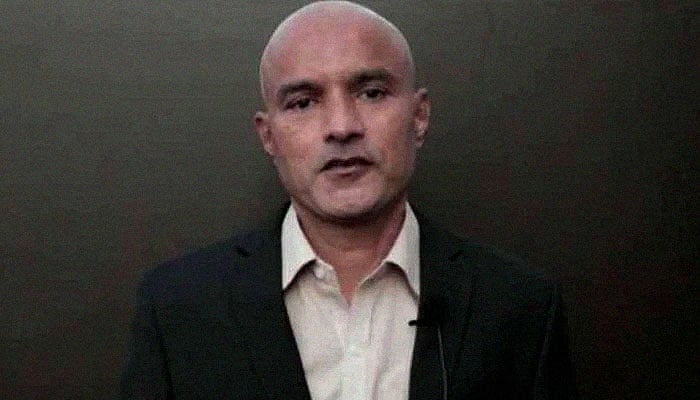The inside details of meeting between Indian diplomats and Kulbhushan Jadhav
'Indian diplomats' behaviour was surprising. Why did the diplomats ask for consular access when they didn't even want to talk to Kulbhushan?'
ISLAMABAD: Foreign Minister Shah Mehmood Qureshi on Thursday explained what transpired after Pakistan made good on its agreement to provide uninterrupted consular access to Indian spy Kulbhushan Jadhav but New Delhi's diplomats chose not to meet the RAW agent and left instead.
Terming the move as revealing "India's ill-intentions", Qureshi said Pakistan had provided the diplomats from its east-side neighbour uninterrupted and unimpeded consular access to Jadhav for the second time in two years.
"Two Indian diplomats were given consular access to Kulbhushan today, according to what was agreed upon. [However], India's ill-intentions have been unmasked. They did not want consular access," Qureshi said.
The foreign minister explained that Jadhav kept calling for the Indian diplomats but they left. "Kulbhushan kept repeating that he wanted them to talk to him and they left," he stated.
"The Indian diplomats' behaviour was surprising. Why did the diplomats ask for consular access when they did not even want to talk to Kulbhushan?"
Qureshi underlined that the Indian diplomats had objected to a glass in the middle, as well as the audio- and video-recording of the meeting — the latter of which was removed and the former not carried out.
"All of the two Indian diplomats' wishes were fulfilled but they left nonetheless," he mentioned.
'Unimpeded, uninterrupted access'
According to the Foreign Office statement on Thursday, Pakistan had provided India unimpeded and uninterrupted consular access to Jadhav — a serving commander of Indian Navy associated with Indian spy agency Research and Analysis Wing (RAW) — for a second time at India's request.
"Two consular officers of the Indian High Commission in Islamabad were provided unimpeded and uninterrupted consular access to Commander Jadhav at 1500 hours", according to the statement released today.
An offer was first made in August, last year, but it was rejected by India as it sought unimpeded access to him. Subsequently, on September 2, 2019, the first consular access under the Vienna Convention on Consular Relations (VCCR) 1963 was provided.
Pakistan committed to implementing ICJ judgment
Jadhav's mother and wife were allowed to meet him on December 25, 2017. The spy was arrested on March 3, 2016, from Balochistan on allegations of espionage and terrorism.
According to the FO statement, he had confessed during investigation to "to his involvement in terrorist activities inside Pakistan that resulted in loss of many precious human lives".
"He also made important revelations about RAW’s role in sponsoring state terrorism in Pakistan," the statement added.
Jadhav was given a death sentence by a Pakistan military court on April 10, 2017.
"Pakistan remains committed to fully implementing the International Court of Justice (ICJ)’s judgment of 17 July 2019," said the FO, also hoping that India will cooperate with Pakistan to see that the judgment is given "full effect".
Jadhav refuses to appeal sentence
Last week, FO Director-General South Asia Zahid Hafeez, in a press conference, said that usually consular access is granted once, however Pakistan as a “humanitarian gesture was extending another such offer for the second time”.
This time, he said, the offer was made for Jadhav's meeting with his wife and father.
He also said that Jadhav still has a chance to file a review petition against his sentence and conviction.
A review and reconsideration petition could be filed by Jadhav, his legally-authorised representative or a consular officer of the Indian High Commission at the Islamabad High Court (IHC), Hafeez said, adding that Pakistan had offered to assist in arranging a legal representative for the spy.
He explained that Pakistan had, on May 20, enacted the ICJ Review and Reconciliation Ordinance, under which a review petition may be submitted to the IHC within 60 days of the legislation coming into effect.
The 60-day time limit ends on July 19.
Jadhav had been offered the chance on June 17, 2020, but he had refused to avail it.
-
Security forces gun down 30 terrorists in multiple IBOs in KP: ISPR
-
MQM-P calls for new province in Sindh
-
US report validates Pakistan military edge over India: PM
-
Banned TTP poses serious threat to Pakistan security: UNSC panel
-
CM Afridi clarifies remarks on by-poll after ECP requests army deployment
-
Dubai sees 3.2m Pakistani passengers in 2025 as airport sets new milestone
-
Security forces kill 23 Indian proxy terrorists in KP's Kurram
-
Pakistan to construct island to boost oil exploration: report












